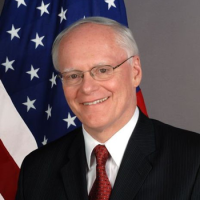The Future of Violent Extremism in the Middle East
March 23 marked two years since the collapse of the Islamic State's caliphate, which for five years represented the pinnacle of jihadi extremism in the 21st century. Yet ISIS is estimated to have at least 10,000 fighters still capable of marauding attacks, assassinations and bombings in Iraq and Syria. More than a dozen franchises--stretching from West Africa to East Asia—also represent a threat to local, regional and international security. And ISIS globally remains an engine for radicalization.
Selected Quotes
Robin Wright, USIP-Wilson Center Distinguished Fellow
"The reality is many of these groups have legitimate support and significant support on the ground. In Afghanistan, the Taliban is popular in some parts of the country. It has prevailed; the estimate is the Taliban controls at least 50 percent of the country."
"There is something in the middle that isn’t being addressed in any of these conflicts, and that is how do you take those who have been alienated?.. Not all of them agree necessarily with the ideology, but they do agree with the idea that someone is going to represent them, someone is going to empower them… The big question is how do we de-radicalize?"
Ambassador James F. Jeffrey, Chair of the Middle East Program, Former Ambassador to Iraq and Turkey
"We have to avoid thinking that we can fix the underlying problems. It is true that the reason we have terrorism in this part of the world and don’t have it in Scandinavia is the underlying social and economic conditions. We just don’t know how to fix those underlying social and economic conditions."
"Diplomacy is critically important when we engage even with limited forces because we scramble the local geostrategic situation... Diplomacy has to ensure when we are doing X, typically counterterrorism, we do not simultaneously do Y: provoke a problem in the neighborhood that undercuts our whole terrorist activity."
Ali Soufan, Chairman and CEO of The Soufan Group
"The Biden administration must ensure that counterterrorism tools and strategies remain an integral part of a comprehensive approach to United States national security. And, cannot be wholly divorced from the great power competition."
"The more we get engaged with these conflicts, the more we are becoming part of the problem, or we are seen as part of the problem, not part of the solution. Because immediately you have taken sides. And when you take sides in these conflicts, you are taking sides that are rooted in history, that are rooted in culture… if you make one happy, you will make the others upset, and then you become part of the problem."
Speakers


Former ambassador to Iraq and Turkey, and Special Envoy to the Global Coalition To Defeat ISIS

Introduction

Moderator

Hosted By

Middle East Program
The Wilson Center’s Middle East Program serves as a crucial resource for the policymaking community and beyond, providing analyses and research that helps inform US foreign policymaking, stimulates public debate, and expands knowledge about issues in the wider Middle East and North Africa (MENA) region. Read more

